but enough about me…
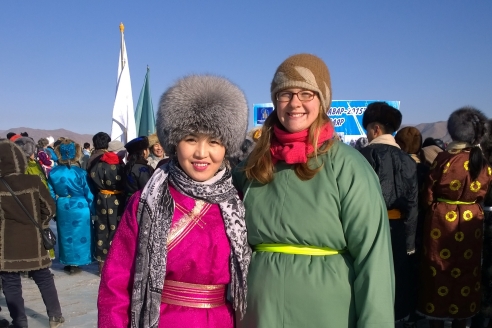
Dashka and April at the Bayankhongor Ice Festival, January 2015
Let’s talk about you. What do you think of me?
— Bette Midler as CC Bloom, Beaches
After twenty months in country and twenty-eight posts on this blog, it occurs to me I’ve done a lot of talking about myself. And as much as I do love to talk about me, and all the funny things that happen to me in Mongolia, we all know the only real way to get to know another country is through the people you meet there. And I’ve met some incredible people in Mongolia. Now, with little more than six months left in my service, I regret not doing a better job capturing some of their stories. So, before I go, I want to fix that. First up, a profile of my dear friend and fellow English teacher, Dashka. Hopefully this will be just the first of several profiles I manage to post before my time in Mongolia comes to a close. But, again, enough about me…
Small girl, tall building
The first time my friend Dashka (full name Otgon Dashdulam) saw a two-story building, she was eight years old. The daughter of herders, she grew up in the countryside just outside Zag, a small soum in Bayankhongor whose population today is around 3,000. It was her first time visiting the soum center where she would start school, and she still remembers what she was wearing that day: a black, yellow-trimmed deel made by her mother with material salvaged from one of her father’s worn deels, tights fashioned out of two legwarmers, sewn together with some leftover green fabric that would be hidden under her clothes, and new red shoes. “I was so excited,” she says. “The night before, we went around to all of my relatives’ gers, and they each gave me a little money for the trip. But when I got home, I couldn’t sleep. I was just waiting, all night.”
The next morning, she and her father set out, making the four-hour, thirty-kilometer trip on horseback.
“As we got close to the town, I saw the building and was so amazed,” she says. “My eyes got wide. I said to my dad, ‘What a tall building!’ I couldn’t stop thinking, how do people get up to the top? He just said to me, ‘Oh, if you study well, you will see many tall buildings.’”
If we were in the States telling this story, you might think Dashka were an 80- or 90-year old woman, but in fact, she turned 30 last August. In Mongolia, no one would find her story surprising or uncommon.
What they might find surprising, however, is that at 30, Dashka is single. One of seven children—four older sisters, a younger sister and a younger brother—she’s the last to have children and marry. (In that order; in Mongolia, couples rarely marry before they’ve had their first child.) Last summer, Dashka’s mom went to the temple to seek the Lama’s advice on her daughter’s prospects. Fortunately, the Lama reassured her, saying she needn’t worry. “Your daughter is very thoughtful,” he said. She will have a boyfriend in due time.”
Perhaps her parents knew from the beginning, though, that Dashka would be a little different from her siblings. Her name is a clue: “In Mongolia, people name their children all the same,” she explained to me. “So my sisters are Oyunkhand, Oyunbileg, Oyun-Erdene, Oyunsaikhan, and Oyuntugs. When I was small, I asked my dad, ‘Why everybody is Oyun, Oyun, Oyun, Oyun, but I’m Dashduulam?’ He said, ‘Oh, because you’re special,’” she laughs, “And then I felt better.”
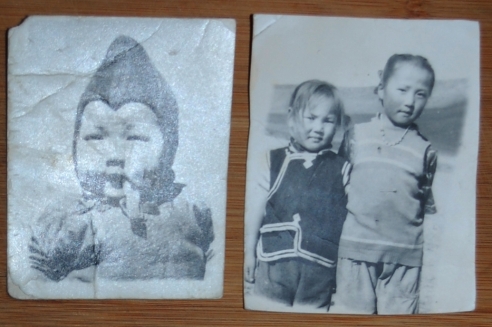
Left: Dashka as an infant, exact age unknown. Right: Dashka, age 7 with her sister Oyuntugs, age 4.
In fact, though, part of the reason her name is different is that Dashka’s parents thought she’d be a boy. After four girls, they were trying for a boy but sadly, all of the boys born to them had been stillborn. “My mom gave birth twelve times,” Dashka says. “All of the boys died; we don’t know why. My younger brother is the only one who lived.”
Despite the hardship, Dashka says she grew up in a very happy home, with all nine members of her family living in a single ger (again, not uncommon in Mongolia). She speaks with admiration about how hard her parents worked. “My mom would milk the yaks twice a day. But it was during Communism so they’d give all the milk to the government until they met the requirement. Sometimes, even though we had many yaks, we didn’t have meat or dairy products for ourselves. If we were hungry, Mom would make boortsog.” (Boortsog is a small donut-like pastry made with flour, water, yeast, and a little sugar.) “And at the time, there were only one or two stores in Zag. They sold clothes but they’d sell out very quickly. If you didn’t know somebody, you couldn’t buy. My mom could only get some meters of cloth. Many nights after we were all asleep, she’d sew our clothes for us. Even she sewed our underwear!”
Dashka credits her parents for her own work ethic: “My dad would always say, ‘Even if a person’s body is small, they can do many things if they try from their hearts.” And her mom, she says, raised them on Mongolian proverbs, a favorite of which was, Zutgel baival, zuugeer gazar uhnа: If you have the will, you can dig a ditch with a needle.
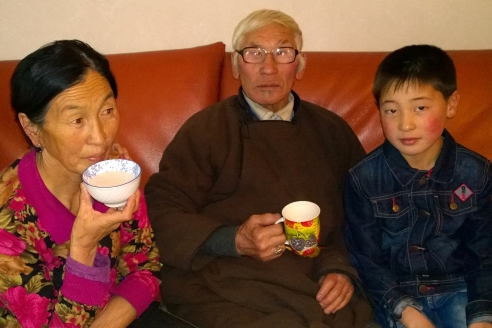
Dashka’s parents with their grandson Muugii (December, 2014)
Dashka talks about how as a young girl, she’d collect dung to fuel the family’s fires, carrying a big basket on her back. “My father would tell me to only fill it half-way, because it would be very heavy. But even if I was sweating, I’d tell him, ‘No, Dad. Even I am small, I can!’”
That work ethic carried over to her schoolwork as well and in eighth grade, her parents sent her to Ulaanbaatar (where, for the record, there are many tall buildings) to live with her sister and attend high school. At the time her favorite subjects were chemistry and Mongolian, and she thought she might become a doctor one day. But in tenth grade, one of her classmates asked their teacher, Otgonbat, what she thought she should be. “My teacher told her, ‘You should be a journalist; you would be very successful as a TV journalist.’” Other students began raising their hands, with their teacher giving each a careful response. Finally, Dashka raised her hand. “‘Bagshaa [my teacher],’ I said, ‘What about me?’ and she said so many nice words. She said, ‘You should be a teacher. I think god made you to be a teacher because you do everything from your heart. You would be a very good teacher and you would pay attention to each of your students from your heart.’”
And so it was settled. In Mongolia at the time, students graduated after tenth grade, then took entrance exams specific to the universities at which they hoped to enroll. Dashka opted out of the exam for the medical university and instead tested for entrance into the education college. She placed sixth out of 586 students. Her performance meant that she was not only accepted into the college, but that she also had the choice of any number of career tracks. She could study to be a school social worker, a school psychologist, a primary school teacher, a Mongolian & Russian teacher, a Mongolian & English teacher, or a Mongolian Literature teacher.
But on the day she had to declare her focus, she didn’t know what to do. “I was good at literature and Mongolian. And the day before, I’d gone to the Children’s Library to recite poems. They were so beautiful and I thought I’d study to be a Mongolian Literature teacher. But I wasn’t sure. At the time, students were just starting to use cell phones, and my parents had sent me a little money, enough to buy one second-hand. I used it to call my teacher. ‘Bagshaa,’ I said. ‘I’m standing in line and we’re about to choose our classes. I don’t know what I should do.’ She said, ‘Just wait there. I’m very close. I’ll be there soon. Let’s talk.’”
Otgonbat told Dashka that English would be very important, and that she should study to be a Mongolian & English teacher. “But that made me nervous. Because I’d gone to school in a small soum until eighth grade, I was very bad at English. I never read books in other languages, only Mongolian. I was only a beginner at English. But my teacher said, ‘You can,’ and so I did.”
Dashka laughs and shakes her head remembering her university English studies. “I was so bad—worse than all the other students! My teacher would give us short texts and I would memorize them. But I never knew what they meant! Can you imagine? But I think my teacher felt sorry for me. And so maybe she gave me a better grade than I deserved.”
Dashka says that even when she left university, her English was not what it should have been. (Surprising to me because I find her English skills to be some of the best in Bayankhongor.) “I scored only 70%, maybe even lower, on my final exam. That scared me. I thought, I’ve finished school, I have no one left to teach me. So I bought another textbook and spent all summer studying. I took practice tests almost every day.”
Soon after, she met her first Peace Corps volunteer. Peter was working at Nomgon School (also known as School #2) in Bayankhongor. The school would be hiring one English teacher for the 2008-2009 school year, and Peter had been asked to administer a speaking test for all applicants.
“I was so nervous. But I tried to look really confident, and to speak as conversationally as I could. Before he could even ask my name, I said, ‘Let me introduce myself…’ I was just acting!”
Sarangerel, the head of the school’s foreign language department, said she’d text just one person by the end of the day. “It was raining and raining that day,” Dashka remembers. “And I was waiting and waiting.” Finally, that evening, she got the text offering her the job. Of some ten or twenty applicants, she’d received the highest combined score for the written and oral exams.
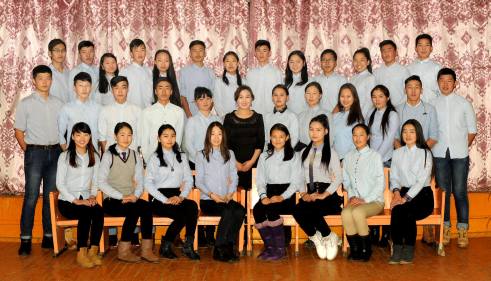
Dashka with her home room class. They were named Best Class at Nomgon High School this year, in recognition for their on-time attendance record and participation in school activities.
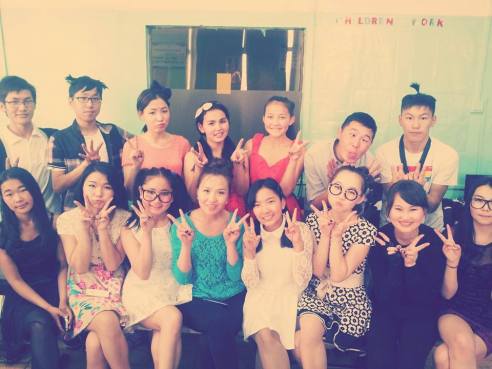
A little less serious.
Dashka vowed to keep improving as an English teacher, with the help of Sarangerel and Peter. Since then, she’s gone on to befriend all twelve volunteers who’ve followed in Bayankhongor. I think of her as Bayankhongor’s unofficial ambassador to the Peace Corps. Don’t have any friends yet? She’ll have you over for dinner. Need help with Mongolian? She’ll tutor you. Looking for a spinner to make washing your clothes easier? She’ll help you buy it—but you’re also always welcome to wash your clothes in her machine (and to use her shower to boot.)
“I’m single,” she’ll tell you. “So I have time to help!”
Raising girls
Two years ago, Dashka managed to purchase an apartment, something impressive for someone her age to do alone. She says she was considering buying a car, but her mother wisely suggested an apartment would be the better investment. The Mongolian government grants a small parcel of land to each citizen once in their lifetime; Dashka sold hers to cover the down-payment, and committed to a mortgage that would take 70% of her salary every month for the next fifteen years.
But if money’s tight for Dashka, you’d never know it. When I ask how she manages to live on just 30% of her salary, she’s pragmatic: Her English language skills allow her to work as a tour guide every summer, and the extra income covers her utilities for the full year. It also covers any clothes she needs, so she doesn’t shop the rest of the year. She buys a new winter coat every two years, though her parents, after “reading the animals” last winter said it would be a mild one, and so she postponed that purchase until this season. In terms of furnishings for the studio apartment, she has a couch, a chair, a small kitchen table and two stools. Instead of a bed, mats on top of a very nice area carpet, her biggest investment to-date, do just fine.
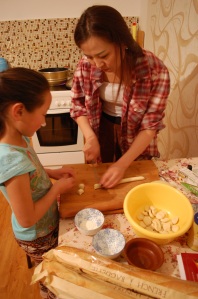
Dashka and Anu making bansh (small dumplings)
Fine enough, in fact, that two of her nieces—Unuruu, 15, and Anu, 9—have come to live with her. Unuruu’s parents live in Zag’s soum center, whose school goes only to the ninth grade. Anu’s parents herd yaks in the countryside; to attend school she needs to live either in the soum or the aimag center. So during the schoolyear, Dashka is more like a single mother than single woman: She cooks dinner with the girls, shops with them for clothes and school supplies, helps with homework, meets with teachers to check their progress, and even enforces discipline when necessary. Two weeks ago, on a day when Dashka had had to leave early for work, another teacher asked why Anu hadn’t come to school. Turns out, Anu had decided to stay home and watch TV. For the next several days, Dashka carried the TV antenna with her in her purse.
Somehow, Dashka makes it all look easy. I never hear her talk about being stressed or overworked or overtired. “My parents had very hard lives,” she says. “My father was an orphan. His mother died when he was two, his father when he was eight. After that, his older brother went to the army and the rest of his brothers and sisters went to live with relatives, each to a different family. When he was twelve, his brother came back and they lived together, but they didn’t have much money. My mother never knew her father. She grew up with her mother and her aunt, who never got married because she didn’t want to leave her sister alone to raise two children. My mom grew up calling her aunt Aaw [Dad]. And then my parents got married young and had all of us. They always remind us that we have very good lives, and should never complain.”
Like a foreigner
In many ways, Dashka is a modern woman living a modern life: She resides in the aimag center, owns her own apartment, and travels all around Mongolia with tourists from France, England, and the US during the summer. And while most people I meet in Bayankhongor have never left the country, Dashka’s sense of adventure and disciplined financial management have allowed her to travel abroad, to both India and Korea. Like many English teachers here, she also dreams of traveling to America. I’ve told her she’s welcome to stay with me during her summer break next year, and we’ve been making informal plans.
There’s just one wrinkle: Last August, shortly after her mom went to visit the Lama, Dashka met and began dating someone. The man, who will remain nameless for now, has lived in the aimag center for nine years, arriving just before Dashka, though in all that time they’d never met. (They don’t know how that’s possible.) He is a very good man: thoughtful, intelligent, hard-working, and kind. Like Dashka, he’s careful with his money, using the majority of what he earns to help his mother and other family members. He’s slow to anger and never smokes or drinks alcohol. This last fact is always said with a little wonder and deep admiration. In a country where alcoholism is rampant and significantly tied to both unemployment and domestic violence, reporting that a man does not drink alcohol is equal to saying he is of the very highest moral fiber.
Though her boyfriend has learned a little English, he hasn’t spent the years Dashka has interacting with Americans and others from outside Mongolia. When Dashka talks to him about long-term planning—say, what they’ll do in a few weeks’ time—it amuses him. “You’re like a foreigner,” he tells her. I suspect it’s one of the many things he likes about her, but he’ll still suggest that they wait to make any plans. “It’s OK,” he’ll say, “We can decide at the time.”
Mongolia’s just-in-time culture hasn’t prevented others from making plans on their behalf, however. Recently, as people have begun to find out about their relationship, several have suggested it might be time for Dashka to settle down. It’s been nearly six months after all. “You should have a baby next year,” one of her fellow teachers told her. Her younger sister, a nurse, suggested the same, adding that she needs to consider her age.
Dashka is her usual cheerful self when discussing the situation, but you can tell it weighs on her. She wants a family very much, and yet there are still some other dreams she’d like to pursue. It’s not easy to do both in Mongolia and there aren’t many people who understand why she’d want to in the first place. For now, Dashka is leaning toward making one last trip before settling down. She’ll be 32 next August, but trusts she’ll still have time.
Seeing America will require a little ingenuity. It’s an expensive trip, especially for someone with a hefty mortgage. But like always, Dashka knows she can dig a ditch with a needle if she needs to. Her parents have a small wooden house and ger in the aimag center where they’ve been living for the past few years with Anu’s sister Togtuunaa, 10, and their other cousins Muugii, 10, and Zaya, 15. Her parents want to rest in the countryside next year, and so Dashka’s planning to rent her apartment out and move into her parents’ home with all five kids. When I ask if this will be difficult, she just smiles and with a sparkle in her eye says, “Maybe. But I can. I’ve lived in a ger with many people before. I think l’ll adjust very quickly.”
So, if you’re looking for an apartment to rent in Bayankhongor for the next year or two, give Dashka a call. It’s a beautiful two-year old space, just next to the department store, and a few steps away from the base of Erdenemandal mountain. It has wood floors throughout, a large bathtub with a powerful water heater, built-in kitchen cabinets, and a refrigerator.
Also, it’s on the top floor.
Leave a comment